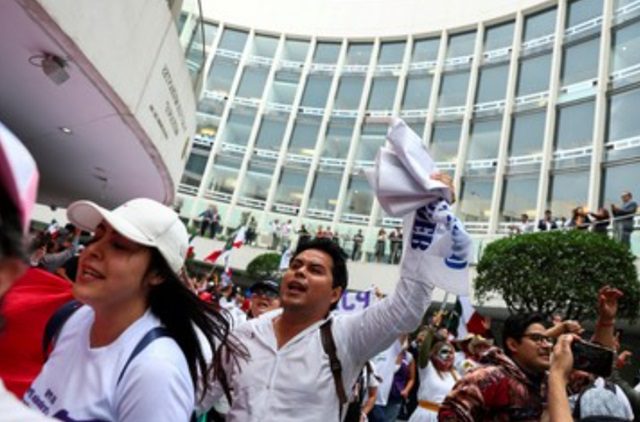BTN News: A surge of protests erupted at the Mexican Senate this Tuesday, halting a critical session discussing a controversial judicial reform proposal. Hundreds of demonstrators, including judicial officials on strike and university students, stormed the Senate building, demanding an end to what they see as a threat to judicial independence. The reform, which aims to make judges elected by popular vote and reduce the size of the Supreme Court, has sparked fierce debate across Mexico. The proposal has divided the nation, with critics fearing it could undermine the judiciary’s autonomy while supporters argue it will make the legal system more accountable to the people.
Judicial Reform Sparks Outcry: Protesters Storm Senate Building
The session at the Mexican Senate took a dramatic turn when protesters breached the building’s security. After hours of chanting and demonstrating outside, the crowd, which included striking judicial workers and university students, pushed through the security barriers and entered the Senate chamber. Demonstrators held up signs and chanted slogans like “Senator, stop the dictator!” and “The judiciary will not fall!” as they filled the hall, forcing Gerardo Fernández Noroña, the Senate leader, to declare an indefinite recess.
Political Tensions Rise Amid Reform Debate
The proposed judicial reform, presented by Senator Ernestina Godoy of the ruling party Morena, has been described as a response to long-standing demands for a more transparent and equitable legal system in Mexico. The reform suggests a shift to popular elections for judges starting in 2025, reducing the number of Supreme Court justices from eleven to nine, and establishing a Tribunal of Judicial Discipline to address corruption among judges. “This reform strengthens democracy and affirms the division of powers, ensuring the judiciary reflects the will of the people, not political negotiations,” Godoy argued during the session.
Opposition Claims Political Pressure and Intimidation
Opposition parties have voiced strong concerns over the reform, suggesting it would allow the Morena party, led by President-elect Claudia Sheinbaum, to exert undue influence over the judiciary by appointing partisan judges. Legislators from the conservative National Action Party (PAN) accused Morena of exerting pressure on lawmakers to secure the 86 votes necessary to pass the constitutional amendment. Further controversy emerged when it was reported that Senator Miguel Ángel Yunes Márquez temporarily left his position, allowing his father, Miguel Ángel Yunes Linares, to assume his seat amid alleged threats of legal action from Morena against the Yunes family.
Controversial Arrests and Allegations of Coercion
Accusations of political manipulation have not been limited to the Senate. The opposition party Movimiento Ciudadano (MC) highlighted the arrest of the father of Senator Daniel Barreda in Campeche, governed by Morena’s Layda Sansores, as an attempt to sway Barreda’s vote against the reform. These allegations have only intensified the atmosphere of political tension, with opposition members decrying what they perceive as an assault on democratic norms.
What Does the Reform Mean for Mexico’s Judiciary?
If passed, the judicial reform will fundamentally change Mexico’s legal landscape by making judges accountable to voters rather than political appointments. Supporters argue it is a vital step toward transparency and citizen involvement, while critics warn it could lead to further politicization of the judiciary and erode its independence. The creation of a Tribunal of Judicial Discipline, in particular, is seen by some as a mechanism that could be used to target judges viewed unfavorably by the government.
Senate Session on Hold Amid Growing Unrest
As the protests continued, Senate leader Fernández Noroña urged calm and called for a pause in proceedings. “I ask the senators to remain calm,” he stated, acknowledging the rising tension. Despite his plea, the demonstrators remained resolute, occupying the Senate chamber, signaling their determination to block the reform.
Public Opinion Divided Over Proposed Changes
Public reaction to the reform has been deeply polarized. Proponents believe it will democratize the judiciary and curb corruption, while opponents fear it is a strategic move to consolidate power. The debate has underscored a broader struggle over the balance of power in Mexico, with both sides mobilizing to influence the outcome.
Next Steps in the Political Showdown
The indefinite suspension of the Senate session leaves the future of the reform uncertain. With both sides digging in their heels, it remains to be seen how the standoff will resolve. However, the events of this Tuesday have highlighted the intense political passions that this judicial reform has ignited across the country.
Conclusion:
The protests at the Mexican Senate signal a growing divide over the proposed judicial reform that aims to overhaul the country’s legal system. As lawmakers prepare to reconvene, the debate over whether the reform represents a step forward for democracy or a dangerous consolidation of power is likely to continue, both inside the Senate chamber and throughout Mexico.


